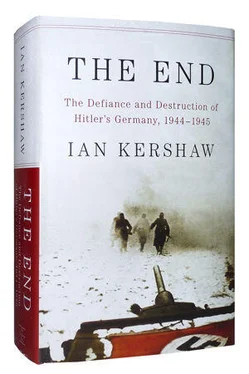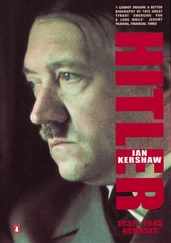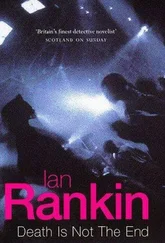—— ‘Die NSDAP und die deutsche Gesellschaft im Zweiten Weltkrieg’, in Kriegsende in Deutschland , Hamburg, 2005.
Orlow, Dietrich, The History of the Nazi Party , vol. 2: 1933–1945 , Newton Abbot, 1973.
Orth, Karin, Das System der nationalsozialistischen Konzentrationslager: Eine politische Organisationsgeschichte , Hamburg, 1999.
Orth, Kathrin, ‘Kampfmoral und Einsatzbereitschaft in der Kriegsmarine 1945’, in Jörg Hillmann and John Zimmermann (eds.), Kriegsende 1945 in Deutschland , Munich, 2002.
von Oven, Wilfred, Mit Goebbels bis zum Ende , vol. 2, Buenos Aires, 1950.
—— Finale Furioso: Mit Goebbels bis zum Ende , Tübingen, 1974.
Overmans, Rüdiger, ‘Das Schicksal der deutschen Kriegsgefangenen des Zweiten Weltkrieges’, in DRZW, vol. 10/2.
—— ‘Die Toten des Zweiten Weltkriegs in Deutschland’, in Wolfgang Michalka (ed.), Der Zweite Weltkrieg: Analysen, Grundzüge, Forschungsbilanz , Munich and Zurich, 1989.
—— Deutsche militärische Verluste im Zweiten Weltkrieg , Munich, 1999.
—— ‘55 Millionen Opfer des Zweiten Weltkrieges? Zum Stand der Forschung nach mehr als 40 Jahren’, Militärgeschichtliche Mitteilungen , 48 (1990).
Overy, Richard, Why the Allies Won , London, 1995.
The Oxford Companion to the Second World War , ed. I. C. B. Dear and M. R. D. Foot, Oxford, 1995.
Padfield, Peter, Himmler: Reichsführer-SS, London, 1990.
Padover, Saul K., Psychologist in Germany: The Story of an American Intelligence Officer , London, 1946.
Parker, R. A. C., Struggle for Survival: The History of the Second World War , Oxford, 1990.
Patrick, Stephen B., ‘The Ardennes Offensive: An Analysis of the Battle of the Bulge’, in Albert A. Nofi (ed.), The War against Hitler: Military Strategy in the West , Conshohocken, Pa., 1995.
Pätzold, Kurt, and Weißbecker, Manfred, Geschichte der NSDAP 1920–1945 , Cologne, 1981.
Paul, Gerhard, ‘ “Diese Erschießungen haben mich innerlich gar nicht mehr berührt”: Die Kriegsendphasenverbrechen der Gestapo 1944/45’, in Gerhard Paul and Klaus-Michael Mallmann (eds.), Die Gestapo im Zweiten Weltkrieg: ‘Heimatfront’ und besetztes Europa , Darmstadt, 2000.
—— and Primavesi, Alexander, ‘Die Verfolgung der “Fremdvölkischen”: Das Beispiel der Staatspolizeistelle Dortmund’, in Gerhard Paul and Klaus-Michael Mallmann (eds.), Die Gestapo: Mythos und Realität , Darmstadt, 1995.
Peikert, Paul, ‘ Festung Breslau’ in den Berichten eines Pfarrers 22. Januar bis 6. Mai 1945 , ed. Karol Jonca and Alfred Konieczny, Wrocław, 1993.
Petzold, Heinz, ‘Cottbus zwischen Januar und Mai 1945’, in Werner Stang und Kurt Arlt (eds.), Brandenburg im Jahr 1945 , Potsdam, 1995.
Peukert, Detlef, Die Edelweißpiraten: Protestbewegungen jugendlicher Arbeiter im Dritten Reich , Cologne, 1980.
Pickholz-Barnitsch, Olga M., ‘The Evacuation of the Stutthof Concentration Camp’, Yad Vashem Bulletin , 16 (1965).
Poll, Bernhard (ed.), Das Schicksal Aachens im Herbst 1944: Authentische Berichte , Aachen, 1955.
—— Das Schicksal Aachens im Herbst 1944: Authentische Berichte II , Aachen, 1962.
Pöllmann, Guido, ‘Rote Armee in Nemmersdorf am 22.10.1944’, in Franz W. Seidler and Alfred M. de Zayas (eds.), Kriegsverbrechen in Europa und im Nahen Osten im 20. Jahrhundert , Hamburg, 2002.
Pommerin, Reiner, ‘The Wehrmacht: Eastern Front’, in David Wingeate Pike (ed.), The Closing of the Second World War: Twilight of a Totalitarianism , New York, 2001.
Probert, Henry, Bomber Harris: His Life and Times , London, 2001.
Rahn, Werner, ‘Die deutsche Seekriegsführung 1943 bis 1945’, in DRZW , vol. 10/1.
Rass, Christoph, ‘Das Sozialprofil von Kampfverbänden des deutschen Heeres 1919 bis 1945’, in DRZW , vol. 9/1.
—— ‘Menschenmaterial’: Deutsche Soldaten an der Ostfront. Innenansichten einer Infanteriedivision 1939–1945 , Paderborn, 2003.
—— Rohrkamp, René, and Quadflieg, Peter M., General Graf von Schwerin und das Kriegsende in Aachen: Ereignis, Mythos, Analyse , Aachen, 2007.
Rauchensteiner, Manfried, Der Krieg in Österreich 1945 , 2nd edn., Vienna, 1984.
Rebentisch, Dieter, Führerstaat und Verwaltung im Zweiten Weltkrieg , Stuttgart 1989.
—— and Teppe, Karl (eds.), Verwaltung contra Menschenführung im Staat Hitlers , Göttingen, 1986.
Rees, Laurence, Auschwitz: The Nazis and the ‘Final Solution’ , London, 2005.
Reibel, Carl-Wilhelm, Das Fundament der Diktatur: Die NSDAP-Ortsgruppen 1932–1945 , Paderborn, 2002.
Reitlinger, Gerald, The Final Solution , Sphere Books edn., London, 1971.
Rendulic´, Lothar, Gekämpft, Gesiegt, Geschlagen , Wels, 1952.
Reuth, Ralf Georg, Goebbels , Munich and Zurich, 1990.
Reynolds, Michael, The Devil’s Adjutant: Jochen Peiper, Panzer Leader , Staplehurst, 1995.
Richarz, Monika, Jüdisches Leben in Deutschland: Selbstzeugnisse zur Sozialgeschichte 1918–1945 , Stuttgart, 1982.
Riedel, Hermann, Halt! Schweizer Grenze! , Konstanz, 1983.
Rohland, Walter, Bewegte Zeiten , Stuttgart, 1978.
Rossiwall, Theo, Die letzten Tage: Die militärische Besetzung Österreichs 1945 , Vienna, 1969.
Rothfels, Hans, The German Opposition to Hitler , pb. edn., London, 1970.
Rudorff, Andrea, ‘Blechhammer (Blachownia)’, in Wolfgang Benz and Barbara Distel (eds.), Der Ort des Terrors: Geschichte der nationalsozialistischen Konzentrationslager , vol. 5, Munich, 2007.
Rusinek, Bernd-A., ‘ “Wat denkste, wat mir objerümt han”: Massenmord und Spurenbeseitigung am Beispiel der Staatspolizeistelle Köln 1944/45’, in Gerhard Paul and Klaus-Michael Mallmann (eds.), Die Gestapo: Mythos und Realität , Darmstadt, 1995.
Sauer, Paul, Württemberg in der Zeit des Nationalsozialismus , Ulm, 1975.
—— Demokratischer Neubeginn in Not und Elend: Das Land Württemberg-Baden von 1945 bis 1952 , Ulm, 1979.
Schellenberg, Walter, Schellenberg , pb. edn., London 1965.
Scheurig, Bodo, Alfred Jodl: Gehorsam und Verhängnis , Berlin and Frankfurt am Main, 1991.
Schmidt, Matthias, Albert Speer: Das Ende eines Mythos , Berne and Munich, 1982.
Schmiechen-Ackermann, Detlef, ‘Der “Blockwart”: Die unteren Parteifunktionäre im nationalsozialistischen Terror- und Überwachungsapparat’, Vf Z , 48 (2000).
Schmier, Louis Eugene, ‘Martin Bormann and the Nazi Party 1941–1945’, Ph.D. thesis, University of North Carolina at Chapel Hill, 1969.
Schönherr, Klaus, ‘Der Zusammenbruch im Osten: Die Rückzugskämpfe seit Sommer 1944’, in DRZW, vol. 8.
—— ‘Ferdinand Schörner—Der idealtypische Nazi-General’, in Ronald Smelser and Enrico Syring (eds.), Die Militärelite des Dritten Reiches , Berlin, 1995.
Schroeder, Christa, Er war mein Chef: Aus dem Nachlaß der Sekretärin von Adolf Hitler , Munich and Vienna 1985.
Schulz-Naumann, Joachim, Mecklenburg 1945 , Munich, 1989.
Schwarz, Egbert, ‘Die letzten Tage des Dritten Reiches: Untersuchung zu Justiz und NS-Verbrechen in der Kriegsendphase März/April 1945’, MA thesis, University of Düsseldorf, 1990.
Schwarz, Michael, ‘Ethnische “Säuberung” als Kriegsfolge: Ursachen und Verlauf der Vertreibung der deutschen Zivilbevölkerung aus Ostdeutschland und Osteuropa 1941 bis 1950’, in DRZW, vol. 10/2.
Читать дальше












